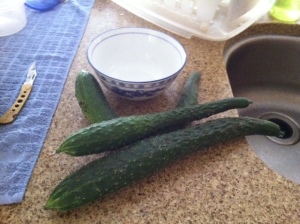One of the side effects of chemotherapy is constipation and/or diarrhea. Medical teams typically recommend over the counter medications to alleviate these discomforts, but ordinary Chinese have a different solution – food as medicine.
A topic that comes up often in my house is that Americans eat too much heat. Often my husband will say, of pizza for example, there’s too much heat in that food; you shouldn’t eat it. Once when I had constipation in Beijing, and we were hungry late at night, we went to a 24 hour noodle shop. Bin had a discussion of heat and cool foods with the attendant behind the counter. The place was one of those convenience food places where you order at the counter, like a Chinese McDonalds. Even though, it was a very basic eatery, both the attendant and the cook spoke with animation about the right food to balance the excessive heat in my body and after eating the dish they recommended, the problem was alleviated. I’ve seen Bin have this heat/cool discussion with many restaurant staff and it seems a standard requirement of all employees in Chinese restaurants. Indeed, Bin and his parents think all Chinese know these basic facts.
During our recent park walk, Ma Huang and Pa Hu gave me a list of foods that correspond to heat, which is to say they cause constipation and a list of food that cause cool, which is to say they cause diarrhea. Meats and dairy products are highest in heat. That’s why peperoni pizza has too much heat. While eggs have heat, oil often makes the pipes move, so if looking for something to stop up the movement, eat boiled eggs or eggs in egg drop soup. Also bananas stop up bodies – most mothers know this from feeding infants.
Most of the foods with cool in them are Chinese unique vegetables. All the vegetables that end with “gua” in Chinese including kugua which is generally know as bitter squash if purchased at a store where they translate it to English. Donggua, which is winter squash. Huanggua, which is cucumbers, should be readily available in the U.S. I’m not sure if the long, nearly 2’ long narrow Chinese cucumbers would be better for this. My personal experience is that drinking the Aloe juice helps alleviate constipation. It’s common in all Korean convenience stores, but not so common in the U.S., most Asian markets carry Aloe juice and I think it’s available online, through Amazon or similar online retailers. I’ve been told that coconut milk will make things move. Eating watermelon makes things move. Also, if this is even possible, aerobic excises such as jogging or fast walking will make things move.
My experience using food to adjust my digestive tract is that these solutions don’t come with the stomach cramps that I usually experience if I try to take some over the counter medication for the problem.
Ma Huang says all this knowledge was given to humans when God made us – knowledge of the purpose of every plant, of acupressure and acupuncture. Her description sounds as though we were given a kind of users manual for the human body and our planet. From a cultural anthropological perspective, I find this story fascinating. In Sociology of Religion, I was told that Buddhism has a concept of God as a universal energy force, not a sentient being. But a users manual sounds more like the communication of a sentient being. In any case, their understanding of food, wherever it has come from has been very helpful for me.




